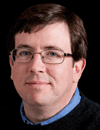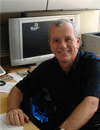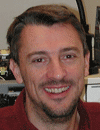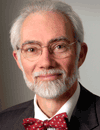Other Track AgendasCancer & Stem Cells | Cell Based Assays | Cell Culture | Circulating Tumor Cells | Flow Cytometry |

Tuesday, 22 January 2013 |
Technologies that are Gaining Traction in R&D Applications of Flow Cytometry |
| | 09:30 |  | Keynote Presentation Spectral Flow Cytometry: High Speed Single Cell Spectroscopy
John Nolan, CEO, Cellarcus Biosciences, Inc., United States of America
Spectral flow cytometry is opening new possibilities for single cell analysis by enabling sophisticated spectroscopy and spectral analysis approaches to be applied to individual cells with high throughput. |
| 10:30 | Coffee Break and Networking | 11:15 |  | Keynote Presentation Flow Cytometry and Cell Sorting: Single Cells and Cell Types
David Galbraith, Professor, University of Arizona, United States of America
Flow cytometry provides a unique way to characterize individual cells for purification by cell sorting. This presentation will outline methods for the analysis of the different cell types found in complex eukaryotic tissues and organs. |
| 12:15 | Lunch Break and Networking in Exhibition Hall | 13:30 | Poster Viewing Session | |
Focus on Imaging |
| | 14:15 | Cytometry-Photojournalism of Biology
Timothy Bushnell, Director, Core Operations, University of Rochester Medical Center, United States of America
Imaging flow cytometry combines the statistical power and speed of flow cytometry with the visual resolution of microscopy. This presentation will focus on the power of this technology in new applications to further biological research. | 14:45 | Delineation of Rare and Closely Related Hematopoietic Populations Utilizing Imaging Flow Cytometry
Kathleen McGrath, Research Assistant Professor, University of Rochester, United States of America
Our work analyzing rare megakaryocyte populations and overlapping populations of erythroblasts using imaging flow cytometry will be presented with a focus on how to select features and controls as well as approaches for analysis of large imaging data sets. | 15:15 | Coffee Break and Networking in the Exhibition Hall | 16:00 | Microfluidically-unified Cell Culture, Sample Preparation, Imaging and Flow Cytometry for Measurement of Signaling Pathways with Single Cell Resolution
Anup Singh, Senior Manager, Sandia National Laboratories, United States of America
A microfluidic platform is presented that integrates and automates cell culture and preparation with flow cytometric analysis for systems-level interrogation of signaling in single cells. | 16:30 | End of Day One |
Wednesday, 23 January 2013 |
High Content Focus (Immunology) |
| | 09:00 | Making Flow Experiments Easier and More Efficient
Leonore A Herzenberg, Professor, Stanford University, United States of America
| 09:30 | Using Multicolor Flow Cytometry to Dissect B Cell Development
Richard Hardy, Professor, Fox Chase Cancer Center, United States of America
We used multicolor FACS to show that mouse autoreactive CD5+ B1 B-cells arise by a distinctive developmental pathway, from precursors present in fetal liver. Now we show that retroviral provision of Lin28b/Let7 redirects development, switching fetal to adult and vice-versa. | 10:00 | Single Cell Systems-Structured View of Immunity & Cancer
Garry Nolan, Professor/Director, Stanford University, United States of America
I will present evidence of a hierarchy of functional trans-cellular modules in the immune system that can be used for mechanistic and clinical insights for both immune health and cancer. | 10:30 | Coffee Break and Networking in the Exhibition Hall | 11:15 |  | Keynote Presentation Integrating Flow Cytometry and Single Cell Transcriptomics
Mario Roederer, Senior Investigator, National Institutes of Health, United States of America
Measuring protein expression by flow cytometry and gene expression by single-cell transcriptomics reveals enormous heterogeneity among cells in the immune system. Combining these technologies provides information about post-transcriptional mechanisms as well. I will discuss application of these state-of-the-art measurements to evaluation of immunopathogenesis and vaccine responses. |
| 12:15 | Lunch Break and Networking in Exhibition Hall | 13:30 | Poster Viewing Session | |
High Content Focus (Pathways, Discovery and Analysis) |
| | 14:15 |  | Keynote Presentation Expanding the Cell Analysis Space With High Throughput Flow Cytometry
Paul Robinson, Professor of Biomedical Engineering, Purdue University Cytometry Laboratories, United States of America
Defining the relationships between cells and their discrete functions requires the ability to collect multiparameter information on each cell. In so doing, a phenotype can be defined that identifies each and every population analyzed. A major advantage of flow cytometry is its ability to evaluate individual cells and specific subsets of population in a mixed environment, on condition that there are sufficient identifying characteristics such as surface or intracellular proteins. Reducing these complex systems however, can be difficult and has been a barrier to large scale flow cytometry until now. |
| 15:15 | Coffee Break and Networking in the Exhibition Hall | 15:45 | Exploring New Paradigms in Drug Discovery with HT Flow Cytometry
Larry Sklar, Principal Investigator, University of New Mexico, United States of America
UNMCMD identifies and implements novel applications of the HyperCyt flow cytometry platform for small molecule discovery in 384 and 1536 well format. Flow cytometry allows analysis of multiplexed cellular and molecular targets. | 16:15 | Leukemia Stem Cells: To Seek and Destroy
Monica Guzman, Assistant Professor, Cornell University, United States of America
Leukemia stem cells (LSCs) play an important role in the maintenance of leukemia. Detection and isolation of LSCs using flow cytometric approaches to identify targets to ablate this malignant population of cells while sparing their normal counterparts will be discussed. | 16:45 | Flow Cytometry Applications in Molecular Biology
David Farrar, Associate Professor, UT Southwestern Medical Centre, United States of America
Standard approaches to studying processes of signal transduction and transcriptional regulation of gene expression have been limited by biochemical techniques requiring large sample material. Recent advances in flow cytometry have allowed the interrogation of complex biochemical pathways in single cells. | 17:15 | Close of Conference |
|

 Add to Calendar ▼2013-01-22 00:00:002013-01-23 00:00:00Europe/LondonFlow CytometrySELECTBIOenquiries@selectbiosciences.com
Add to Calendar ▼2013-01-22 00:00:002013-01-23 00:00:00Europe/LondonFlow CytometrySELECTBIOenquiries@selectbiosciences.com